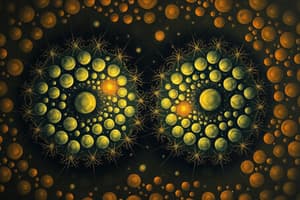Podcast
Questions and Answers
What is the term for a cell or organism that has two sets of chromosomes?
What is the term for a cell or organism that has two sets of chromosomes?
- Tetrad
- Haploid
- Chromatin
- Diploid (correct)
What is the main purpose of mitosis in somatic cells?
What is the main purpose of mitosis in somatic cells?
- To create genetically identical daughter cells (correct)
- To increase genetic diversity
- To produce gametes
- To perform DNA replication
What key structures are involved in the organization and separation of chromosomes during mitosis?
What key structures are involved in the organization and separation of chromosomes during mitosis?
- Sister Chromatids and Tetrads
- Centriole and Spindle Fibers (correct)
- Cell Membrane and Nucleolus
- Chromatin and Nucleus
During which phase of the cell cycle does DNA replication occur?
During which phase of the cell cycle does DNA replication occur?
What is the result of a tetrad formation?
What is the result of a tetrad formation?
What occurs during prophase of mitosis?
What occurs during prophase of mitosis?
Which process occurs in prometaphase?
Which process occurs in prometaphase?
What happens to the chromosomes during metaphase?
What happens to the chromosomes during metaphase?
What significant event occurs during anaphase?
What significant event occurs during anaphase?
Which of the following correctly describes telophase?
Which of the following correctly describes telophase?
What happens to the golgi apparatus during prophase?
What happens to the golgi apparatus during prophase?
During which stage do centrosomes move towards opposite poles?
During which stage do centrosomes move towards opposite poles?
What is a key feature of metaphase?
What is a key feature of metaphase?
What is the primary outcome of the cell cycle?
What is the primary outcome of the cell cycle?
What distinguishes binary fission from eukaryotic cell division?
What distinguishes binary fission from eukaryotic cell division?
How many chromosomes do humans have?
How many chromosomes do humans have?
What role do genes play in the chromosomes of humans?
What role do genes play in the chromosomes of humans?
Which statement is TRUE about eukaryotic cell division?
Which statement is TRUE about eukaryotic cell division?
What is a significant consequence of cell cycle malfunction?
What is a significant consequence of cell cycle malfunction?
What is the main purpose of mitosis in eukaryotic cells?
What is the main purpose of mitosis in eukaryotic cells?
Which of the following statements about chromosomes is incorrect?
Which of the following statements about chromosomes is incorrect?
What is a primary importance of mitosis in organisms?
What is a primary importance of mitosis in organisms?
During which phase of mitosis does the cleavage furrow form in animal cells?
During which phase of mitosis does the cleavage furrow form in animal cells?
What structure forms in plant cells to complete the division of the cytoplasm?
What structure forms in plant cells to complete the division of the cytoplasm?
Which of the following processes occurs during prophase?
Which of the following processes occurs during prophase?
In which phase of mitosis do chromosomes align at the equator of the cell?
In which phase of mitosis do chromosomes align at the equator of the cell?
What occurs at the end of telophase?
What occurs at the end of telophase?
What is the correct order of events during mitosis?
What is the correct order of events during mitosis?
What happens to the spindle fibers during the final stages of mitosis?
What happens to the spindle fibers during the final stages of mitosis?
What occurs during Anaphase I of meiosis?
What occurs during Anaphase I of meiosis?
What significant event occurs during Telophase II of meiosis?
What significant event occurs during Telophase II of meiosis?
During which phase do spindle fibers form in each cell of meiosis II?
During which phase do spindle fibers form in each cell of meiosis II?
What is the result of crossing over during Prophase I of meiosis?
What is the result of crossing over during Prophase I of meiosis?
What is the fate of the daughter cells after Telophase I?
What is the fate of the daughter cells after Telophase I?
What happens to sister chromatids during Anaphase II?
What happens to sister chromatids during Anaphase II?
What characterizes the cells produced at the end of meiosis compared to the original cell?
What characterizes the cells produced at the end of meiosis compared to the original cell?
What important function does sexual reproduction serve in animals?
What important function does sexual reproduction serve in animals?
Flashcards are hidden until you start studying
Study Notes
Cell Cycle and Division
- The cell cycle comprises events of growth, synthesis, and regulation, leading to cell division.
- Types of cell division include mitosis (eukaryotic cells) and binary fission (prokaryotic cells).
Prokaryotic Cell Division
- Binary fission is the method used by bacteria for reproduction.
- It results in clonal offspring, where daughter cells are identical to the parent.
Eukaryotic Cell Division
- Humans have 46 chromosomes organized into 23 pairs, containing thousands of genes influencing growth and body functions.
Mitosis Overview
- Mitosis is nuclear division in somatic cells, producing two genetically identical daughter cells.
- Critical for growth, tissue regeneration, and replacing damaged or lost cells.
Stages of Mitosis
- Prophase: Chromosomes condense, becoming visible; nuclear envelope disassembles; spindle fibers form.
- Prometaphase: Microtubules attach to kinetochores; chromosomes align towards the cell equator.
- Metaphase: All chromosomes align at the metaphase plate.
- Anaphase: Sister chromatids separate as proteins degrade centromeres; chromatids move to opposite poles.
- Telophase: Chromosomes decondense; nuclear envelopes re-form around each set; spindle disassembles.
Cytokinesis
- In animal cells, a cleavage furrow forms to divide the cytoplasm.
- In plant cells, a cell plate forms during division.
Regulation of the Eukaryotic Cell Cycle
- The cell cycle is regulated by checkpoints that monitor progression through key phases.
Meiosis Overview
- Meiosis is essential for sexual reproduction, creating gametes with half the chromosome number (haploid).
Meiosis I Stages
- Anaphase I: Homologous pairs are separated; sister chromatids remain together.
- Telophase I: Homologues cluster at poles; nuclear envelopes reform; cytokinesis may occur; daughter cells have half the chromosomes.
Meiosis II Stages
- Prophase II: New spindle fibers form; nuclear envelope breaks down.
- Metaphase II: Chromatids align at the cell equator; kinetochores from opposite poles attach to chromatids.
- Anaphase II: Sister chromatids are pulled towards opposite poles of the cells.
- Telophase II: Nuclear membranes re-form; cytokinesis results in four genetically diverse haploid cells.
Importance of Meiosis
- Meiosis increases genetic diversity through random assortment during metaphase I and crossing over in prophase I.
Sexual Life Cycle
- Sexual reproduction involves meiosis and fertilization, leading to genetic variation in offspring.
Studying That Suits You
Use AI to generate personalized quizzes and flashcards to suit your learning preferences.




